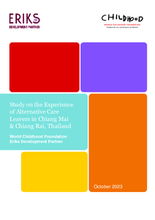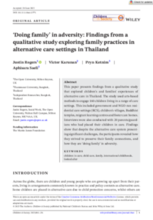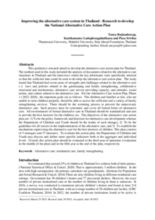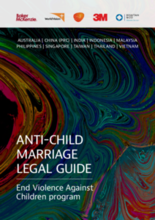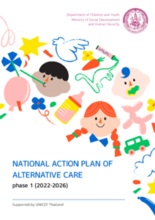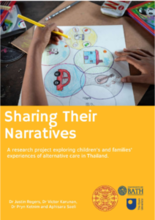This country page features an interactive, icon-based data dashboard providing a national-level overview of the status of children’s care and care reform efforts (a “Country Care Snapshot”), along with a list of resources and organizations in the country.
demographic_data
childrens_living_arrangement
children_living_without_bio
adoption
social_work_force
key_stakeholders
Key Stakeholders
Add New Datadrivers_of_institutionalisation
Drivers of Institutionaliziation
Add New Datakey_research_and_information
Key Data Sources
Add New DataThailand Alternative Care Case Study
Prevalence and number of children living in institutional care: global, regional, and country estimates
Displaying 11 - 20 of 103
The purpose of this study is to explore how growing up in private residential care in Chiang Mai and Chiang Rai provinces of Thailand has affected children’s well-being over time. The research provided an important opportunity for young people to describe and analyze their experience, as well as make their own conclusions and recommendations.
This paper presents findings from a qualitative study that explored children's and families' experiences of alternative care in Thailand. The study used arts-based methods to engage 160 children living in a range of care settings.
This qualitative research aimed to develop the alternative care action plan for Thailand. The method used in this study included the analysis of documents related to the alternative care situations in Thailand and the interviews where the key informants were specifically selected so that the collected data could be used to develop the alternative care action plan.
This Anti-Child Marriage Guide produced by World Vision aims to empower and educate users as how to best navigate regulatory hurdles that may arise when assisting children affected by child marriage. This fourth legal guide addresses frequently asked questions relating to protecting victims of child marriage in Australia, Mainland China, India, Indonesia, Malaysia, the Philippines, Singapore, Taiwan, Thailand, and Vietnam.
This new study reveals that over 120,000 children in Thailand are living in institutional settings, mostly due to poverty and limited access to education. 90% have at least one living parent. Although institutional care may be appropriate in emergencies, it is often overly misused and can affect children’s emotional, cognitive and mental development. More than 50% of private “orphanages” are unregistered and unregulated.
National Plan of Action on Alternative Care for Children Phase 1 (2022 - 2026) has been prepared to provide the direction of alternative care operations in Thailand that reflects the spirit of practices on alternative care for children in 5 areas:
The overall aims of this research project were to explore the experiences of the children, parents and families involved in alternative care in Thailand. This research project reached a significant number of children (n.160) living in alternative care and their parents and families (n.20).
यस अध्ययनले सातवटा केन्द्रित देशहरूमा २१ अर्ध-संरचित अन्तर्वार्ताहरू समावेश गरी गुणस्तरीय अनुसन्धान अध्ययन सञ्चालन गरेर निजी रूपमा सञ्चालित र वित्त पोषित आवासीय हेरचाह संस्थाहरूको सानो संख्यामा COVID-19 को प्रभावको अन्वेषण गर्दछ।
This webinar, the fifth in the Transforming Children's Care Webinar Series focused on a new study ('Impact of COVID-19 on Privately Run Residential Care Institutions: Insights and Implications for Advocacy and Awareness Raising'). The study, comprising 21 semi-structured interviews across seven focus countries, explores the effect of COVID-19 on a small number of privately run and funded residential care institutions.

